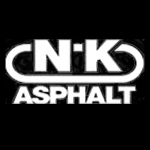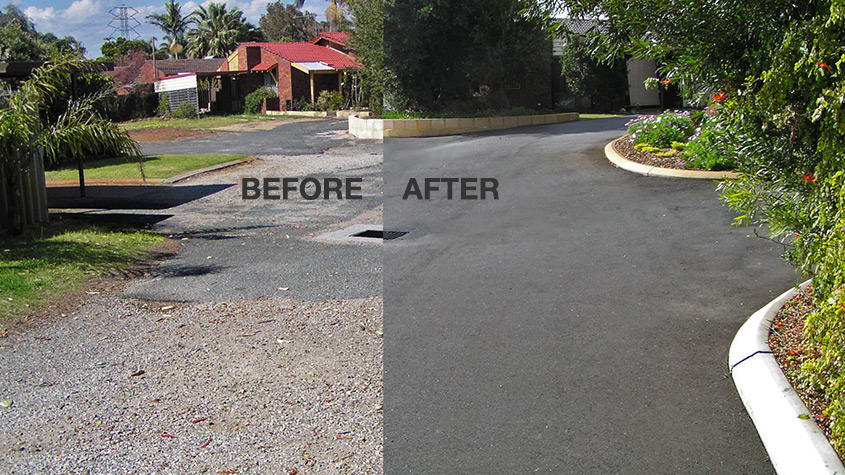Should You Choose Concrete or Asphalt Driveway Resurfacing?
So you’re in need of resurfacing but unsure whether to go with concrete or asphalt driveway resurfacing?
Relax – we can help! This article will uncover the major differences between asphalt and concrete driveways, some common questions, as well as several considerations to gauge prior to making your final decision.
Am I Best Suited To An Asphalt Or Concrete Driveway?
Asphalt and concrete are used extensively across Australian roads, runways and carparks, both provide users with an extensive range of options. Before embarking on a driveway resurfacing project, it is always essential to ensure the foundations are solid before you begin as this will help prolong the longevity of your installation.
If you are choosing between an asphalt or concrete driveway, it is likely that you’re facing a cracked or aged surface that needs a facelift to add that all important street appeal, or perhaps you’re keen to add a wow factor to your home, business or strata complex.
Trevor from NK Asphalt offers some valuable advice,
“If cracked, concrete usually needs to be replaced. It will rarely look good, or last, if repaired or patched, whereas asphalt is much easier to repair, either with resurfacing or removing a section and replacing.”
Considerations When Choosing A Concrete vs Asphalt Driveway
- The size of the area you are resurfacing – Is it a small, narrow driveway or a large carpark?
- The visual aesthetic you are looking for – Do you prefer a lighter or darker surface colour and is glare a factor?
- How you plan to use the surface – Will it support light vehicles or commercial machinery?
- The environment surrounding the surface – Is the surface exposed to extreme temperatures?
- Your preference of planned maintenance – Do you want regular or minimal maintenance?
- Any risk of chemicals damaging the surface – Are there potential risks of oil/petrol or acid/chemical spills?
- Risk of surrounding vegetation impacting the driveway– Any large trees or bushes nearby?
As covered in on our Asphalt vs Concrete Driveways page, the above factors can ultimately determine the most ideal driveway material to use for your next project. Once you have considered these main questions, you will then be able to assess the surroundings and requirements needed in order to make a final decision between an asphalt or concrete driveway.
Which Is Most Popular – An Asphalt Or Concrete Driveway?
Asphalt driveway resurfacing is generally the preferred option in Australia, the same with carparks, larger driveways, semi-rural areas and high traffic areas as it is more easily repaired and can be resurfaced again in future at a relatively low cost. Having said this, there are several factors to consider when choosing a material to resurface a driveway and different materials may suit different requirements.
Concrete vs Asphalt Driveways – What Are The Main Differences?
One of the key differences between asphalt and concrete is the binder used for each. Asphalt uses bitumen whilst concrete uses cement, and it is this difference which contributes to the pavement’s overall characteristics such as the look, feel, cost and durability of the end product.
When choosing between an asphalt or concrete driveway, one of the key benefits of asphalt is that is doesn’t require expansion joints or curing time, meaning a faster installation process and downtime before the area can be used.
Another popular reason for choosing an asphalt driveway is its ability to ‘cure’ and become ready for use soon after resurfacing. For concrete driveways, it can be one to three weeks, whereas asphalt can be ready to be driven on within hours. This is of particular advantage when dealing with long, semi-rural driveways or parking areas to shops, residential units and commercial premises, or anywhere that time is at a premium.
What About The Risk Of Surrounding Vegetation?
Whilst both asphalt and concrete driveways can be damaged by tree roots, asphalt tends to crack and deform to a hump, whereas the concrete cracks and lifts as a raised jagged edge, with potential tyre damage and trip hazard.
Asphalt Driveway Resurfacing Cost vs Concrete Resurfacing
Due to numerous variables from one job to another, an ‘average’ rate is not available. Each job comes with a series of considerations to take into account, ranging from size, access, locations and the condition of the existing surface, as well as the types of vehicles used on the surface itself.
Whilst there is no official rate when comparing the difference resurfacing an old asphalt drive vs an old concrete drive, it is that the asphalt can usually be resurfaced without any removal of the old pavement, whereas concrete is normally demolished and removed at significant disposal and transport cost, followed by a new full-depth concrete pavement. The downtime for a one or two day asphalt project could be several days plus seven days or more curing for concrete.
As a result, more property owners choose asphalt over concrete driveways due to the initial affordability, with the added bonus of asphalt having easier and cheaper repairs as compared to the cost of fixing damaged concrete.
Asphalt vs Concrete Driveways, Which is Best for Resurfacing?
Weighing up the pros and cons, asphalt is the preferred option for Councils, commercial areas and private driveway resurfacing for the following reasons:
- Cost: Much cheaper than alternatives which require demolition and replacement
- Construction Time: Can be used within hours and laid much quicker than pavers or concrete
- Easy to repair: Cracks can be easily filled to extend the life
- Longevity: Can last 30 years, depending on design and type of use
- Grip: the texture is considered safer because it provides some skid resistance
- Glare: lower reflective glare than limestone, concrete and pavers
A Final Word on Concrete vs Asphalt Driveways
When deciding between concrete or asphalt for your driveway resurfacing, there are numerous factors to consider. After having delivered a series of asphalt solutions for our extensive list of happy clients, we believe asphalt to the more preferred option to concrete.
If you are considering resurfacing an existing asphalt or concrete driveway, we welcome you to contact our team today or request a free on-site quote and advice. Our team of NK Asphalt experts can help you to understand what you need and even provide an estimate over the phone.
Get a Perth asphalt driveway resurfacing quote
If your job is 150m2 or more and in the Perth or surrounding areas.
share


